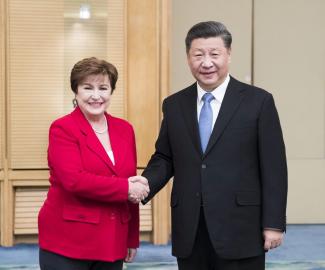Development finance
China is offering alternatives to IMF programmes

When developing countries ran into economic trouble 20 years ago, they had only one place to turn to: the consortium of western-led institutions, including the International Monetary Fund (IMF), the World Bank and the Development Assistance Committee of the Organisation for Economic Cooperation and Development (OECD).
Things have changed because China has emerged as a key player. It sometimes works in cooperation with the western-led institutions and sometimes independently. Scholars have been pondering for years what this means for developing countries. The focus is typically on China’s long-term loans for infrastructure projects and whether they are worth the financial and political risk for borrowers.
However, other impacts deserve scrutiny as well. A case in point is China’s potential role as a rival to the IMF in providing emergency lending. Financial journalists have reported on real or rumored Chinese financial lifelines in dozens of countries. Anecdotes prevail as serious research has lagged behind. Important questions include:
- Is there evidence of Chinese lending replacing IMF programmes?
- How prevalent is this phenomenon?
- Has it strengthened developing countries’ bargaining position in talks with the IMF?
Some western policymakers like to warn that China is pursuing a “dept-trap” policy, trying to ensnare low and middle income countries in dependency. An equally interesting question, however, is whether Chinese lending is reducing those countries’ dependency on the IMF. My research shows that Chinese loans have indeed enabled some countries to avoid turning to the IMF and enabled others to negotiate deals with fewer attached conditions. My findings are based on data for 104 countries from 2001 to 2017.
This trend is healthy given that IMF programmes have often not delivered the expected results. Critics argue that the poor track record results from excessive free-market orthodoxy. Some even speak of an assault on sovereignty. Joseph Stiglitz, the Nobel laureate, has compared IMF conditionality to bloodletting, arguing that loan conditions may be well-intended, but ultimately only harm the patient.
No traps
By empowering borrowers to negotiate for fewer or even zero conditions from the IMF, Chinese loans may be doing more to free developing countries than even the loudest and most prominent IMF critics have achieved so far. It is important to note, moreover, that these loans appear to be less risky than some fear. China has typically denied bailouts to countries without reliable sources of foreign exchange, such as Zimbabwe. The implication is that China is paying attention to debt sustainability rather than trying to ensnare them in debt traps. My data show that countries that export large volumes of natural resources are the most likely to benefit from Chinese loans. Quite clearly, these borrowers see China as an alternative to the IMF.
China is not the first country to undercut the IMF when it suits its strategic interests. In the wake of the Gulf War in 1990, for example, the USA provided emergency assistance to Egypt over the protests of the IMF. France similarly propped up its former colonies in West Africa during the 1980s.
Today, China is providing such options to a new and wider range of countries. Defenders of the IMF will counter that its policy conditionality has softened in the past two decades. They will add that the IMF does more to set nations on a path to long-term prosperity than China does. Among other things they will accuse China of many things, including:
- prioritising borrowing governments’ short-term domestic needs over long-term sustainability and efficiency,
- non-transparent lending with little regard for issues such as corruption and illicit financial flows and
- promoting infrastructure that benefits China’s economic interests (including commodity imports and exports of manufactured goods).
These points may be true in many cases. Borrowing governments will have to weigh the respective benefits of IMF and Chinese loans diligently. They will, however, be happy to have the choice.
Link
Sundquist, J., 2021: Bailouts from Beijing – How China functions as an alternative to the IMF.
https://www.bu.edu/gdp/2021/03/08/bailouts-from-beijing-how-china-functions-as-an-alternative-to-the-imf/
James Sundquist is a fellow at Boston University’s Global Development Policy Center and a doctoral candidate at Yale University.
james.sundquist@yale.edu







